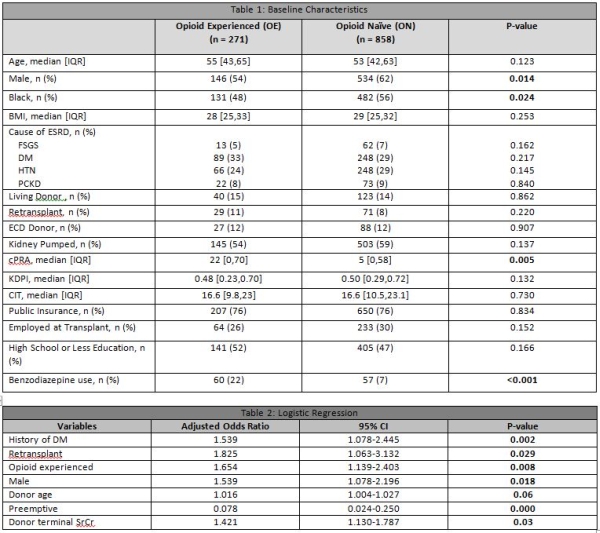The Impact of Pre-Operative Opioid Use on Delayed Graft Function in Adult Kidney Transplant Recipients
MUSC, Charleston, SC.
Meeting: 2018 American Transplant Congress
Abstract number: D50
Keywords: Graft function, Kidney transplantation, Renal dysfunction, Risk factors
Session Information
Session Name: Poster Session D: Ischemia Reperfusion Injury: Time to Change the Fate?
Session Type: Poster Session
Date: Tuesday, June 5, 2018
Session Time: 6:00pm-7:00pm
 Presentation Time: 6:00pm-7:00pm
Presentation Time: 6:00pm-7:00pm
Location: Hall 4EF
Background and Objectives: Opioid use is associated with AKI and ATN through both direct and indirect mechanisms, including alterations in the autonomic nervous system, the renin-angiotensin-aldosterone system and anti-diuretic hormones, as well as dehydration and urinary retention. Therefore, the aim of this study was to evaluate the effects of DGF in pre-transplant opioid users.
Methods: Retrospective, single center analysis evaluating kidney transplants between 1/2010 and 12/2016. Opioid use was determined by medication reconciliation at time of transplant or with an opioid prescription filled in the 3 months prior to transplant. Dichotomous variables were analyzed with Chi-Square and continuous variables were analyzed using Student's t-test or Mann Whitney U.
Results: Out of 1,129 kidney transplants, 271 (24%) were opioid experienced (OE) and 858 (76%) were opioid naïve (ON). Baseline characteristics are shown in Table 1. OE patients were more likely to be Caucasian, highly sensitized and have concomitant use of benzodiazepines prior to transplant. OE patients were statistically significantly (p=0.01) more likely to experience DGF (Figure 1).
OE patients were more likely to be Caucasian, highly sensitized and have concomitant use of benzodiazepines prior to transplant. OE patients were statistically significantly (p=0.01) more likely to experience DGF (Figure 1). A predictive model was created using multivariate logistic regression with backwards elimination that included known risk factors for DGF. Nine variables were included in the model (Table 2). Pre-transplant opioid use was the strongest predictor of DGF (p=0.01). Other significant factors included history of DM, retransplant, male gender, donor age, preemptive status, and donor terminal SrCr.
A predictive model was created using multivariate logistic regression with backwards elimination that included known risk factors for DGF. Nine variables were included in the model (Table 2). Pre-transplant opioid use was the strongest predictor of DGF (p=0.01). Other significant factors included history of DM, retransplant, male gender, donor age, preemptive status, and donor terminal SrCr.
Conclusion: Opioid use prior to kidney transplant is associated with higher rates to DGF.
CITATION INFORMATION: Patel N., O'Brien B., Taber D., Pilch N., Baliga P., Elmaasarani Z., Ball S., Mauldin P., Wilson L., Gilbert R., Fleming J. The Impact of Pre-Operative Opioid Use on Delayed Graft Function in Adult Kidney Transplant Recipients Am J Transplant. 2017;17 (suppl 3).
To cite this abstract in AMA style:
Patel N, O'Brien B, Taber D, Pilch N, Baliga P, Elmaasarani Z, Ball S, Mauldin P, Wilson L, Gilbert R, Fleming J. The Impact of Pre-Operative Opioid Use on Delayed Graft Function in Adult Kidney Transplant Recipients [abstract]. https://atcmeetingabstracts.com/abstract/the-impact-of-pre-operative-opioid-use-on-delayed-graft-function-in-adult-kidney-transplant-recipients/. Accessed February 18, 2026.« Back to 2018 American Transplant Congress
